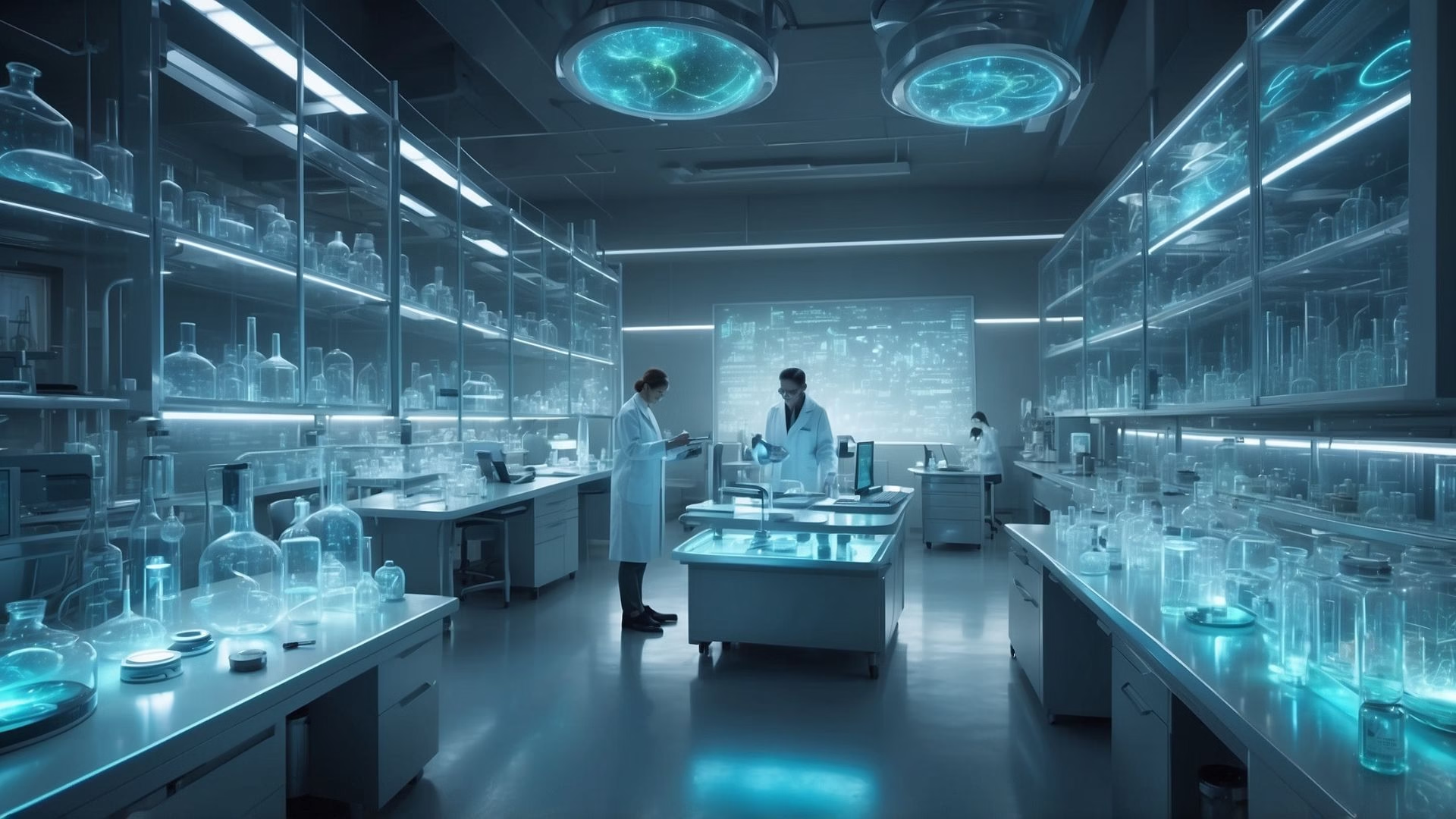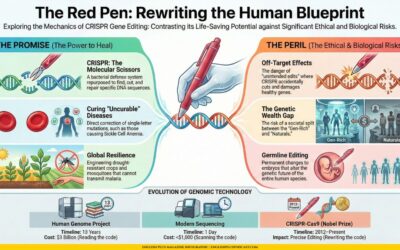Synthetic biology is a groundbreaking field at the intersection of biology and engineering. By designing and constructing new biological parts, systems, and devices, synthetic biology aims to solve complex problems in medicine, agriculture, energy, and beyond. But what exactly is synthetic biology, and how does it impact our world? Let’s explore the foundations, applications, and potential of this exciting scientific discipline.
What Is Synthetic Biology?
At its core, synthetic biology involves redesigning and engineering biological systems to perform specific functions. Unlike traditional genetic engineering, which focuses on tweaking existing genetic material, synthetic biology takes a more holistic and modular approach. It’s about creating entirely new biological parts or reprogramming cells to perform tasks they wouldn’t naturally do.
This field draws on principles from molecular biology, genetics, bioengineering, and computer science. It’s essentially the science of building life—whether that means designing bacteria to produce medicine, creating crops that grow in extreme conditions, or even constructing new forms of life from scratch.
How Does Synthetic Biology Work?
Synthetic biology begins with the design of biological parts, often using computer models to simulate how these parts will behave. These parts can include DNA sequences, proteins, and enzymes that serve as the building blocks of life. Scientists then assemble these parts into systems, introducing them into living cells like bacteria or yeast to test their functionality.
An essential tool in synthetic biology is the biological “toolkit”, which includes:
- Standardized DNA parts called BioBricks that can be assembled into new systems.
- Gene circuits, which mimic electronic circuits to control cellular behavior.
- CRISPR-Cas9 and other gene-editing tools that enable precise modifications.
Applications of Synthetic Biology
Synthetic biology has far-reaching applications that promise to revolutionize multiple industries.
1. Medicine
Synthetic biology is transforming healthcare by enabling the production of new drugs, vaccines, and diagnostic tools. For instance:
- Synthetic microbes are being engineered to produce life-saving drugs like insulin and antibiotics.
- Gene circuits can be programmed to detect and destroy cancer cells.
- Synthetic biology played a critical role in the rapid development of mRNA vaccines for COVID-19.
2. Agriculture
The field is addressing global food security by designing crops that are more resilient to pests, drought, and climate change. Examples include:
- Plants engineered to fix their own nitrogen, reducing the need for chemical fertilizers.
- Synthetic solutions to combat plant diseases and increase yields.
3. Energy
Synthetic biology is paving the way for renewable energy solutions, such as:
- Engineering microbes to produce biofuels from renewable resources.
- Developing organisms that can capture carbon dioxide and turn it into valuable products.
4. Environmental Conservation
Synthetic organisms can help clean up pollution, restore ecosystems, and address climate change. For example:
- Biodegradable plastics made from engineered microbes.
- Synthetic bacteria designed to break down oil spills or plastic waste.
Ethical Considerations in Synthetic Biology
With great power comes great responsibility. Synthetic biology raises ethical questions about safety, accessibility, and potential misuse. Key concerns include:
- Biosafety: Could engineered organisms escape into the wild and disrupt ecosystems?
- Biosecurity: How can we prevent the misuse of synthetic biology for harmful purposes, such as bioterrorism?
- Equity: Who will have access to the benefits of synthetic biology, and how can it be used to reduce global inequalities?
Addressing these concerns requires strict regulations, transparency, and collaboration among scientists, policymakers, and the public.
The Future of Synthetic Biology
As technology advances, synthetic biology holds the potential to reshape industries and address some of humanity’s biggest challenges. Some exciting possibilities include:
- Personalized medicine tailored to an individual’s genetic makeup.
- Artificial photosynthesis to produce clean energy.
- The creation of entirely new life forms designed to perform specific tasks.
However, realizing this future will require continued investment in research, education, and ethical frameworks to guide innovation responsibly.
Synthetic biology is a transformative field that combines the creativity of engineering with the precision of biology. By designing and building new biological parts, scientists are unlocking solutions to problems in healthcare, agriculture, energy, and beyond. While challenges remain, the potential of synthetic biology to benefit humanity is immense. As we move forward, the question is not just what we can create, but how we can ensure it’s used responsibly for the betterment of society.
Let’s Talk
Synthetic biology sounds like something straight out of a science fiction movie, doesn’t it? But the reality is even more fascinating—and a little more complicated. Imagine being able to design life like you’re assembling a piece of furniture, using standardized biological parts instead of screws and bolts. On one hand, it’s mind-blowing to think about all the good this can bring, like creating medicine on demand or engineering crops to thrive in extreme conditions. But on the other hand, doesn’t it feel like we’re treading into “playing God” territory? How do you feel about humans having the ability to create entirely new life forms?
One thing we didn’t touch on earlier is the creativity involved in synthetic biology. It’s not just about solving problems; it’s also about imagining what’s possible. For example, scientists are exploring the idea of using synthetic organisms to terraform other planets, making them habitable for humans. Can you picture bacteria engineered to thrive on Mars, slowly transforming its atmosphere so we could live there? It’s a thrilling concept, but it also raises questions about unintended consequences. What happens if we create something we can’t fully control?
Then there’s the everyday impact. Synthetic biology is already in our lives, from the insulin produced by engineered bacteria to the plant-based meats designed to taste like the real thing. But here’s a fun question: if a synthetic burger tastes exactly like a beef burger, is it still “natural”? And does it even matter, as long as it’s sustainable? It’s interesting to think about how this technology is reshaping not just science, but our culture and values.
What about the ethical concerns? I find it fascinating that while synthetic biology could help clean up pollution or combat climate change, the same technology could be misused. Imagine someone engineering a virus for malicious purposes. It’s a scary thought, but it also underscores why regulation and transparency are so crucial. Do you think we can strike the right balance between innovation and safety?
At the end of the day, synthetic biology challenges us to rethink what life is and what it could be. It’s about more than just manipulating DNA—it’s about creating solutions and, hopefully, a better future. But with great power comes great responsibility, right? So, how do we ensure that this power is used wisely? And what role do you think we, as individuals, play in shaping the direction of synthetic biology?
Let’s Learn Vocabulary in Context
Let’s start with “synthetic biology.” This term combines the idea of something synthetic, or man-made, with biology, the study of life. In practice, it means engineering biological systems to do specific tasks. You might use it in conversation when describing cutting-edge technology, like, “Synthetic biology is revolutionizing how we produce vaccines.”
Next up is “biological parts.” These are the building blocks in synthetic biology, like DNA sequences or proteins, that can be designed and assembled. Think of them as the Lego pieces of life. You could say, “Scientists are designing biological parts to create eco-friendly fuels.”
The term “gene circuits” might sound intimidating, but it’s just a way of programming cells to perform specific functions, like little biological computers. You could use this metaphorically: “My morning routine feels like a gene circuit—it’s programmed to get me through the day.”
Let’s talk about “CRISPR-Cas9.” It’s a precise gene-editing tool that has revolutionized genetic engineering. You might not drop it into casual conversation, but you could explain it like this: “CRISPR is like a pair of scissors for DNA—it can cut and edit genes with incredible accuracy.”
The word “toolkit” came up when describing the resources scientists use. A toolkit is just a collection of tools, literal or metaphorical. You might say, “A good toolkit for problem-solving includes creativity and patience.”
“Resilient” is another key word. It means being able to withstand challenges, like crops engineered to be resilient against drought. In everyday use, you might say, “She’s so resilient; she always bounces back from setbacks.”
The concept of “biosafety” is all about preventing harm when working with biological systems. It’s critical in synthetic biology, but you could also use it to describe being cautious in other areas, like, “Following safety guidelines in the lab is essential for biosafety.”
“Renewable energy” refers to energy sources that don’t deplete over time, like solar or wind power. In synthetic biology, microbes are being engineered to produce biofuels as renewable energy. In conversation, you might say, “Switching to renewable energy is one of the best ways to combat climate change.”
“Biodegradable” means something can break down naturally and return to the environment without causing harm. Synthetic biology is helping create biodegradable plastics. You might use it in a sentence like, “I prefer biodegradable packaging because it’s better for the planet.”
Lastly, let’s explore “terraforming.” This futuristic term refers to altering the environment of a planet to make it habitable for humans. You could use it metaphorically, like, “My backyard garden needs some serious terraforming before it’s ready for spring.”
Here’s something to think about: which of these words do you find most interesting or relevant to your life? How might synthetic biology’s innovations, like biodegradable plastics or renewable energy, affect the way we live in the future?
Let’s Discuss & Write
Discussion Questions:
- How do you feel about synthetic biology’s potential to create entirely new life forms?
- What applications of synthetic biology excite you the most, and why?
- How should society address the ethical concerns surrounding synthetic biology?
- Do you think synthetic organisms should be used to solve environmental problems, like cleaning up pollution?
- What role should governments and the public play in regulating synthetic biology research?
Writing Prompt:
Write a short reflection titled “The Future We Can Build” where you imagine a world transformed by synthetic biology. Describe how innovations like engineered crops, renewable energy, or medical breakthroughs could change daily life. Focus on both the benefits and challenges, and include at least three key vocabulary words from the topic. Aim for 300–400 words, blending creativity with thoughtful analysis.










0 Comments